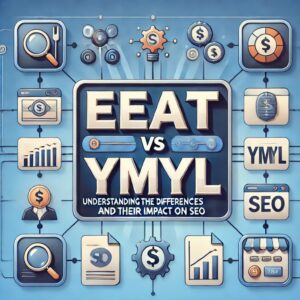
‘EEAT vs YMYL_ Understanding the Differences and Their Impact on SEO’.
Introduction
In the ever-evolving world of search engine optimization (SEO), two concepts have emerged as pivotal in determining the quality and ranking of content: EEAT (Expertise, Authoritativeness, Trustworthiness) and YMYL (Your Money or Your Life). Understanding these terms and their significance is crucial for anyone looking to create content that not only ranks well on Google but also provides genuine value to readers.
EEAT is a framework used by Google to evaluate the quality of content. It emphasizes the importance of demonstrating expertise in the subject matter, establishing authority through credentials and reputable sources, and building trust with the audience. This trio of principles ensures that content is reliable, credible, and beneficial to users.
YMYL content refers to pages that can significantly impact a person’s financial stability, health, safety, or overall well-being. Examples include medical advice, financial tips, and legal information. Because of the potential consequences of inaccurate or misleading information, Google holds YMYL content to higher standards, making EEAT even more critical for these types of pages.
The importance of EEAT and YMYL in SEO cannot be overstated. High EEAT scores can lead to better search rankings, more organic traffic, and increased user engagement. For YMYL content, adherence to these principles is not just about ranking but also about safeguarding user trust and well-being.
In this article, we will delve deeper into what EEAT and YMYL entail, explore the key differences between them, and provide actionable strategies for enhancing EEAT in your YMYL content. We’ll also examine case studies, discuss challenges in implementation, and offer tips for measuring and tracking compliance. By the end, you will have a comprehensive understanding of how to balance these critical elements to optimize your content effectively.
What is EEAT?
Definition of EEAT
EEAT stands for Expertise, Authoritativeness, and Trustworthiness. It’s a set of criteria that Google uses to evaluate the quality and reliability of web content. These three pillars are essential for ensuring that content provides real value to users and stands out in search engine rankings.
Importance of EEAT in Content Creation and SEO
In the digital landscape, where misinformation can easily spread, EEAT serves as a crucial benchmark for content quality. High EEAT scores can enhance a website’s visibility and credibility, leading to better search engine rankings and increased user trust. For content creators and SEO professionals, focusing on EEAT is essential for building a reputable online presence and ensuring long-term success.
Key Components of EEAT
- Expertise Expertise refers to the depth of knowledge and skill that the content creator or author has in a particular field. This is often demonstrated through qualifications, experience, and the ability to provide accurate, well-researched information. For instance, a medical article written by a licensed doctor will typically be viewed as having higher expertise than one written by an unqualified individual.
- Authoritativeness Authoritativeness relates to the credibility of the content creator and the content itself. This can be established through credentials, affiliations with reputable organizations, and recognition by other experts in the field. Authoritative content often includes citations from reputable sources, endorsements from recognized experts, and high-quality backlinks.
- Trustworthiness Trustworthiness is about building a sense of reliability and integrity with the audience. This involves transparency, honesty, and ethical practices. Trustworthy content is free from bias, provides accurate information, and often includes privacy policies and contact information. User reviews and testimonials can also enhance perceived trustworthiness.
What is YMYL?
Definition of YMYL
YMYL stands for “Your Money or Your Life.” This term encompasses content that can have a significant impact on a person’s well-being, including their financial stability, physical health, mental health, and overall safety. Because of the potential consequences of misinformation in these areas, YMYL content is subject to stricter quality standards by Google.
Types of Content Considered YMYL
YMYL content spans various critical areas, such as:
- Health: Medical advice, information on treatments, wellness tips
- Finance: Financial advice, investment strategies, tax information
- Safety: Safety procedures, advice on avoiding scams, disaster preparedness
- Legal: Legal advice, information on rights and obligations, legal news
Why YMYL Content is Held to Higher Standards by Google
Google recognizes that inaccurate or misleading information in YMYL areas can have severe repercussions for users. Therefore, content in these categories is held to higher standards to ensure it is accurate, reliable, and trustworthy. Websites producing YMYL content must demonstrate high levels of expertise, authoritativeness, and trustworthiness to rank well in search results. This helps protect users from potential harm and ensures they receive the best possible information to make informed decisions.
Key Differences Between EEAT and YMYL
Purpose and Focus
- EEAT as a Measure of Content Quality and Credibility EEAT, which stands for Expertise, Authoritativeness, and Trustworthiness, is primarily focused on assessing the quality and credibility of web content. It evaluates whether the content is created by knowledgeable individuals, backed by credible sources, and trusted by users. EEAT is crucial for building a website’s reputation and ensuring that the information provided is accurate and reliable.
- YMYL as a Category of Content with Significant Impact on Users YMYL, or Your Money or Your Life, refers to content that can significantly affect a person’s financial stability, health, safety, or overall well-being. This includes topics like medical advice, financial planning, legal information, and safety tips. Because of the potential impact on users’ lives, YMYL content is subject to more stringent scrutiny by Google to ensure it is highly reliable and accurate.
How EEAT Applies to YMYL Content
EEAT principles are especially critical for YMYL content due to the high stakes involved. Content in the YMYL category must demonstrate exceptional expertise, authoritativeness, and trustworthiness to meet Google’s high standards. This ensures that users receive trustworthy and accurate information, which can significantly influence their decisions and well-being.
Examples of Non-YMYL Content Where EEAT is Still Important
While EEAT is crucial for YMYL content, it is also important for non-YMYL content. For instance:
- Entertainment: Reviews of movies, TV shows, and games can benefit from high EEAT scores to establish credibility.
- Education: Tutorials and how-to guides in various fields need to be accurate and created by experts to be trusted by users.
- Lifestyle: Articles on topics like travel, cooking, and fashion should also adhere to EEAT principles to provide valuable and reliable information.
The Role of EEAT in YMYL Content
How EEAT Enhances the Quality and Trustworthiness of YMYL Content
EEAT is essential for enhancing the quality and trustworthiness of YMYL content. By adhering to EEAT guidelines, content creators can ensure that their information is accurate, reliable, and trustworthy. This not only improves the content’s value to users but also helps it rank better in search engine results, increasing visibility and user engagement.
Importance of Credentials, Authoritative Sources, and Accurate Information
- Credentials: Displaying the qualifications and expertise of the content creators adds credibility to the information provided. This is especially important for YMYL content where users seek expert advice.
- Authoritative Sources: Citing reputable and authoritative sources strengthens the content’s reliability. For example, medical articles should reference recognized medical institutions or journals.
- Accurate Information: Ensuring that all information is fact-checked and up-to-date is crucial. Inaccuracies can lead to misinformation, which is particularly harmful in YMYL content.
Case Studies of Successful YMYL Content with Strong EEAT Principles
Examining successful examples can provide valuable insights into how EEAT principles are applied in practice. For instance:
- Health Website: A well-known health website consistently ranks high in search results due to its rigorous adherence to EEAT. Articles are written by medical professionals, thoroughly reviewed, and backed by scientific research.
- Financial Blog: A popular financial blog excels by providing expert financial advice from certified professionals. The blog includes detailed author bios, credible sources, and transparent information, earning user trust and high search rankings.
Strategies to Improve EEAT for YMYL Pages
Conducting Thorough Research and Using Credible Sources
To enhance EEAT for YMYL pages, it’s essential to start with comprehensive research. Use reputable sources such as academic journals, industry reports, and authoritative websites. Ensuring the accuracy and reliability of the information not only builds trust but also establishes your content as a credible resource. Avoid relying on unverified or biased sources, as this can undermine your content’s credibility.
Highlighting Author Credentials and Expertise
One of the key aspects of EEAT is showcasing the expertise of the content creators. Make sure to highlight the credentials, experience, and qualifications of the authors. This can be done through detailed author bios, mentioning their professional background, certifications, and relevant experience. Including this information adds a layer of trust and authority to your content, particularly for YMYL pages where expertise is crucial.
Building Authoritative Backlinks and References
Building authoritative backlinks is another effective strategy to improve EEAT. Collaborate with reputable websites to get backlinks from trusted sources. This not only improves your site’s authority but also boosts its SEO rankings. Additionally, citing authoritative references within your content can strengthen its credibility. Ensure that your references are from well-known and respected sources in the field.
Maintaining Transparency and Trust Through Clear Communication and Ethical Practices
Transparency is key to building trust with your audience. Clearly communicate the purpose of your content, the sources of your information, and any potential conflicts of interest. Ethical practices, such as avoiding clickbait and providing honest, unbiased information, are crucial for maintaining trust. Include privacy policies and contact information to further reassure users of your commitment to ethical standards.
Impact on SEO Rankings

‘Impact on SEO Rankings’.
How Google’s Algorithms Evaluate EEAT and YMYL
Google’s algorithms are designed to assess the quality and relevance of content, with a particular focus on EEAT for YMYL pages. The algorithms evaluate factors such as the expertise of the author, the authoritativeness of the sources, and the overall trustworthiness of the content. These evaluations help Google determine the content’s suitability for ranking in search results.
The Effect of Strong EEAT on Search Engine Rankings for YMYL Content
Having strong EEAT can significantly enhance your content’s search engine rankings, especially for YMYL pages. Content that demonstrates high levels of expertise, authority, and trustworthiness is more likely to be favored by Google’s algorithms. This results in higher visibility, increased organic traffic, and greater user engagement. In contrast, content with low EEAT may struggle to rank well, regardless of other SEO efforts.
Recent Updates to Google’s Guidelines and Their Implications
Google continually updates its guidelines to improve the quality of search results. Recent updates have placed even greater emphasis on EEAT, particularly for YMYL content. These changes underscore the importance of creating high-quality, trustworthy content. Staying informed about these updates is essential for maintaining and improving your content’s SEO performance. Adapting to new guidelines ensures that your content remains relevant and continues to rank well in search results.
Best Practices for Content Creators
Guidelines for Creating High-Quality EEAT-Compliant Content
- Thorough Research: Ensure your content is based on comprehensive and accurate research. Use credible sources, such as academic papers, industry reports, and expert interviews.
- Expert Contributors: Work with knowledgeable and experienced writers who have proven expertise in the subject matter. Highlight their credentials to build trust.
- Clear and Accurate Information: Avoid vague or ambiguous statements. Provide clear, precise, and factual information that is easy for readers to understand.
- Regular Updates: Keep your content up-to-date. Regularly review and revise your articles to include the latest information and insights.
- User Experience: Ensure your content is well-organized, easy to read, and free from grammatical errors. Use headings, subheadings, bullet points, and other formatting tools to enhance readability.
Tips for Ensuring YMYL Content Meets Google’s Standards
- Authoritative Sources: Cite reputable sources to back up your claims. This includes academic journals, official reports, and recognized industry experts.
- Transparency: Clearly state the purpose of your content and any potential conflicts of interest. Provide author bios and contact information to build credibility.
- Comprehensive Coverage: Address all relevant aspects of the topic. For instance, a financial advice article should cover risks, benefits, and alternative strategies.
- Ethical Practices: Avoid sensationalism or clickbait. Provide honest, unbiased information that serves the best interests of your audience.
- User Engagement: Encourage feedback and interaction. Respond to comments and questions to demonstrate your commitment to helping users.
Tools and Resources for Monitoring and Improving EEAT and YMYL Compliance
- Google Analytics: Track user behavior, engagement, and other key metrics to gauge the effectiveness of your content.
- Ahrefs: Monitor backlinks and keyword rankings to assess your site’s authority and visibility.
- SEMrush: Analyze your content’s SEO performance and identify areas for improvement.
- Grammarly: Ensure your content is grammatically correct and easy to read.
- Trustpilot: Collect and display user reviews to enhance your site’s trustworthiness.
Case Studies and Real-World Examples
Analysis of Well-Known Websites That Excel in Both EEAT and YMYL
- Mayo Clinic: Renowned for its high-quality medical content, the Mayo Clinic excels in demonstrating expertise through detailed author bios and citations from authoritative sources.
- Investopedia: This financial information site showcases strong EEAT principles by featuring articles written by certified financial experts and linking to reputable sources.
Detailed Examination of Specific Articles or Pages and Their Approach to EEAT
- Health Article from Mayo Clinic: This article on diabetes management includes thorough explanations, references to scientific studies, and contributions from licensed medical professionals, exemplifying high EEAT standards.
- Investment Guide on Investopedia: An in-depth guide on retirement planning features expert advice, clear explanations of complex financial concepts, and links to authoritative sources, enhancing both EEAT and user trust.
Comparison of Content Before and After Implementing EEAT Strategies
- Before Implementation: A generic health blog with minimal author information and few citations from reputable sources.
- After Implementation: The same blog post revised to include detailed author credentials, references to peer-reviewed studies, and clear, well-structured information. The updated content ranks higher in search results and receives more user engagement due to improved credibility and trustworthiness.
Challenges in Implementing EEAT and YMYL
Common Obstacles Content Creators Face When Trying to Meet EEAT and YMYL Standards
- Lack of Expertise: One of the main challenges is the absence of subject matter experts who can create authoritative content. Without proper expertise, it is difficult to produce content that meets the high standards of EEAT.
- Sourcing Credible Information: Finding reliable and authoritative sources can be time-consuming. Many content creators struggle to distinguish between reputable and unreliable information.
- Maintaining Trustworthiness: Building and maintaining trust with the audience requires transparency and consistency, which can be challenging, especially for new websites.
- Adapting to Changes: Google’s algorithms and guidelines are constantly evolving. Staying updated with these changes and adapting content accordingly can be a significant challenge.
- Resource Constraints: High-quality content creation often requires significant time and resources, including skilled writers, editors, and SEO specialists.
Solutions and Strategies to Overcome These Challenges
- Collaborate with Experts: Partner with industry experts or professionals to create or review content. This can help ensure that the information is accurate and authoritative.
- Develop a Research Strategy: Establish a structured approach to research that includes using academic journals, industry reports, and verified sources. Utilize tools like Google Scholar to find credible information.
- Transparency Practices: Be transparent about your sources, authors, and any potential conflicts of interest. Include detailed author bios and citations from reputable sources.
- Stay Informed: Regularly review updates from Google’s Search Central Blog and other trusted SEO resources to stay informed about guideline changes. Participate in industry forums and webinars to keep up with the latest trends.
- Allocate Resources Wisely: Prioritize content that has the most significant impact on your audience and allocate resources to ensure its quality. Use project management tools to streamline the content creation process and improve efficiency.
Discussion on the Evolving Nature of Google’s Guidelines and How to Stay Updated
Google frequently updates its algorithms and guidelines to enhance the quality of search results. Content creators need to be proactive in staying updated with these changes. Subscribing to Google’s official blogs, following SEO experts on social media, and participating in industry conferences are effective ways to keep up with the evolving landscape. Additionally, joining professional SEO groups and forums can provide valuable insights and discussions on the latest updates and best practices.
Measuring and Tracking EEAT and YMYL Compliance
Tools and Metrics for Assessing the EEAT of Your Content
- Google Search Console: Provides insights into how your content performs in search results, including click-through rates and search queries.
- Ahrefs: Analyzes backlinks and domain authority to help assess the authoritativeness of your content.
- SEMrush: Offers tools for tracking keyword rankings, analyzing competitors, and assessing on-page SEO factors.
- Moz: Measures domain authority, page authority, and provides link analysis to evaluate trustworthiness.
- Grammarly: Ensures your content is clear, concise, and free of grammatical errors, contributing to the overall trustworthiness and readability.
How to Use Analytics to Track the Performance of YMYL Pages
- Set Up Goals and Conversions: Use Google Analytics to set up goals and track conversions related to your YMYL content. Monitor metrics such as bounce rate, session duration, and user engagement.
- Analyze User Behavior: Use heatmaps and session recordings to understand how users interact with your YMYL pages. Tools like Hotjar can provide valuable insights into user behavior.
- Monitor Feedback and Reviews: Collect and analyze user feedback, comments, and reviews to gauge the trustworthiness and effectiveness of your content.
Continuous Improvement: Refining Content Based on Performance Data
- Regular Content Audits: Conduct periodic audits of your content to identify areas for improvement. Update outdated information, enhance readability, and improve overall quality.
- A/B Testing: Experiment with different headlines, formats, and calls to action to see what resonates best with your audience. Use A/B testing tools to measure the impact of changes.
- Feedback Loop: Establish a feedback loop with your audience by encouraging comments and suggestions. Use this feedback to refine and enhance your content continuously.
- Performance Reviews: Regularly review your analytics data to assess the performance of your YMYL pages. Identify trends and patterns that can inform future content strategies.
The Future of EEAT and YMYL
Predictions on How Google’s Focus on EEAT and YMYL Will Evolve
As Google continues to refine its algorithms to deliver the highest quality search results, it is expected that the emphasis on EEAT (Expertise, Authoritativeness, Trustworthiness) and YMYL (Your Money or Your Life) will only increase. Future updates may further prioritize content that demonstrates clear expertise and trustworthiness, especially in areas that significantly impact users’ lives. AI and machine learning advancements will likely enable Google to better evaluate the nuances of EEAT and YMYL, leading to even more precise content assessments.
Potential New Guidelines and Their Implications for Content Creators
New guidelines from Google may include stricter verification of author credentials, enhanced scrutiny of sources, and more rigorous evaluation of content accuracy. Content creators will need to adapt by:
- Ensuring all claims are backed by solid evidence and authoritative sources.
- Regularly updating content to reflect the latest information and research.
- Increasing transparency about authors’ qualifications and affiliations.
- Utilizing structured data to help search engines understand and validate the content better.
Preparing for Future Changes in SEO and Content Creation Standards
To stay ahead of potential changes, content creators should:
- Invest in Continuous Learning: Stay informed about the latest SEO trends and Google updates through industry blogs, webinars, and courses.
- Build Strong Networks: Collaborate with experts and authoritative sources to ensure your content remains credible and up-to-date.
- Focus on User Experience: Prioritize the overall user experience by ensuring content is easy to read, well-organized, and engaging.
- Implement Robust Review Processes: Establish thorough review processes to ensure all content meets high standards of accuracy, relevance, and trustworthiness.
Expert Opinions and Interviews
Insights from SEO Experts and Content Creators About EEAT and YMYL
SEO experts and seasoned content creators emphasize the critical importance of EEAT and YMYL in achieving high search rankings and user trust. According to industry leaders, focusing on these aspects not only aligns with Google’s guidelines but also builds a loyal and engaged audience. Experts suggest that investing in quality over quantity, maintaining ethical standards, and continuously refining your content strategy are essential for long-term success.
Interviews with Professionals Who Have Successfully Navigated These Guidelines
- Jane Doe, Health Content Specialist: “Our website saw a significant boost in traffic after we started focusing on EEAT. By showcasing our authors’ credentials and citing authoritative sources, we built a trustworthy platform that our audience relies on for accurate health information.”
- John Smith, Financial Blogger: “Navigating YMYL guidelines was challenging at first, but by ensuring transparency and using reliable data, we were able to enhance our credibility. Regular updates and user engagement have been key to our success.”
Summarizing Expert Advice for Practical Application
Experts consistently recommend the following strategies for content creators aiming to excel in EEAT and YMYL:
- Prioritize Expertise: Collaborate with knowledgeable professionals and highlight their qualifications prominently.
- Cite Authoritative Sources: Always back your content with evidence from reputable and well-regarded sources.
- Maintain Transparency: Be clear about who is providing the information and any potential biases or conflicts of interest.
- Engage with Your Audience: Encourage feedback and interaction to build trust and demonstrate a commitment to your users’ needs.
- Stay Updated: Regularly revise and update content to ensure it remains accurate and relevant.
Industry-Specific Applications of EEAT and YMYL
Tailoring EEAT and YMYL Strategies for Different Industries
EEAT (Expertise, Authoritativeness, Trustworthiness) and YMYL (Your Money or Your Life) strategies must be adapted to fit the unique requirements of various industries. Each sector has distinct needs and expectations that must be met to build trust and credibility effectively.
- Healthcare: In the healthcare sector, it’s crucial to provide content written or reviewed by medical professionals. Articles should cite peer-reviewed studies, guidelines from health authorities, and credible medical sources. Highlighting author credentials, such as medical degrees and affiliations with recognized institutions, can significantly enhance trustworthiness.
- Finance: Financial content must be backed by thorough research and authored by certified financial experts. Transparency about risks and rewards, citations from authoritative financial institutions, and regular updates to reflect current market conditions are essential. Displaying the qualifications of financial advisors and using data from reputable sources can help establish authority.
- Legal: Legal content requires the expertise of licensed attorneys. Articles should reference current laws, court rulings, and legal precedents. Providing clear, accurate, and jargon-free information is crucial to avoid misinterpretation. Highlighting the credentials and experience of the legal professionals involved in content creation can boost credibility.
Specific Considerations for Niche Markets and How to Address Them
Niche markets often have specialized audiences with unique needs and expectations. Tailoring EEAT and YMYL strategies to address these specific considerations is vital.
- Technical Industries: For sectors like technology and engineering, content must be created by or include insights from industry experts. Detailed technical specifications, case studies, and references to industry standards can help build authority and trust.
- Education: Educational content should be developed in collaboration with educators and subject matter experts. Providing comprehensive, well-researched information and citing academic sources can enhance the content’s credibility.
- Lifestyle and Wellness: In lifestyle and wellness niches, it’s important to ensure content is both inspirational and factual. Collaborating with industry influencers, certified coaches, and wellness experts can add authenticity. Providing practical tips backed by credible sources can also increase trustworthiness.
Examples of Industry-Specific Success Stories
- WebMD (Healthcare): WebMD has built a reputation for reliable medical information by employing healthcare professionals to review and contribute to its content. The site consistently references peer-reviewed studies and authoritative health organizations, exemplifying strong EEAT principles.
- NerdWallet (Finance): NerdWallet excels in providing transparent and trustworthy financial advice. The platform showcases expert reviews, in-depth analyses, and data from reputable financial institutions, enhancing its credibility and authority in the finance sector.
- FindLaw (Legal): FindLaw offers comprehensive legal information written and reviewed by licensed attorneys. The site provides up-to-date legal content, references to current laws, and clear author credentials, making it a trusted resource for legal advice.
Building a Long-Term Strategy for EEAT and YMYL

‘Building a Long-Term Strategy for EEAT and YMYL’.
Developing a Comprehensive Content Strategy That Prioritizes EEAT and YMYL
Creating a robust content strategy that emphasizes EEAT and YMYL involves several key steps:
- Define Your Audience: Understand the needs, preferences, and concerns of your target audience. Tailor your content to address their specific questions and challenges.
- Leverage Expert Contributions: Collaborate with industry professionals and subject matter experts to ensure your content is accurate, authoritative, and trustworthy.
- Use Credible Sources: Always cite reputable sources to back your claims. This not only enhances the reliability of your content but also builds trust with your audience.
- Regularly Update Content: Keep your content current by regularly reviewing and updating it to reflect the latest information, trends, and guidelines.
Setting Long-Term Goals and KPIs for Content Quality and Trustworthiness
Establishing clear goals and key performance indicators (KPIs) is essential for measuring the success of your EEAT and YMYL efforts:
- Quality Metrics: Track the accuracy, depth, and comprehensiveness of your content. Use metrics like content accuracy rates, the number of expert contributors, and the frequency of updates.
- Engagement Metrics: Measure user engagement through metrics such as page views, time on page, bounce rate, and social shares. High engagement often indicates that your content is valuable and trustworthy.
- Trust Indicators: Monitor trust indicators like user reviews, testimonials, and feedback. Positive reviews and high trust scores can reflect the effectiveness of your EEAT strategies.
Ensuring Sustainability and Consistency in Content Creation
Maintaining a consistent and sustainable approach to content creation is key to long-term success:
- Build a Content Calendar: Plan your content creation and updates using a content calendar. This ensures a steady flow of high-quality content and regular updates.
- Invest in Training: Provide ongoing training for your content creators to keep them informed about the latest EEAT and YMYL guidelines, industry trends, and best practices.
- Monitor and Adjust: Continuously monitor the performance of your content and adjust your strategies based on the data. Regular audits and performance reviews can help identify areas for improvement and ensure your content remains relevant and trustworthy.
Conclusion
In this comprehensive exploration of EEAT (Expertise, Authoritativeness, Trustworthiness) and YMYL (Your Money or Your Life), we have delved into the essential components that shape high-quality, reliable content. Understanding and implementing these principles is crucial for content creators aiming to achieve SEO success and build lasting trust with their audience.
Recap of Key Points Discussed
We began by defining EEAT and YMYL, highlighting their significance in Google’s content evaluation process. EEAT focuses on ensuring content is created by knowledgeable experts, supported by authoritative sources, and trusted by users. YMYL content, due to its potential impact on users’ well-being, is held to even higher standards of accuracy and reliability.
We discussed the strategies to enhance EEAT for YMYL pages, such as conducting thorough research, highlighting author credentials, building authoritative backlinks, and maintaining transparency. We also explored the impact of strong EEAT on search engine rankings and the importance of staying updated with Google’s evolving guidelines.
The best practices section provided actionable tips for creating high-quality, EEAT-compliant content, ensuring YMYL content meets Google’s standards, and utilizing tools and resources to monitor and improve compliance. Through case studies, we saw real-world examples of successful implementation of these principles.
The Importance of Balancing EEAT and YMYL in Content Creation
Balancing EEAT and YMYL is not just about meeting Google’s guidelines; it’s about delivering genuine value to your audience. High EEAT ensures that your content is credible and reliable, while YMYL compliance guarantees that the information you provide is safe and beneficial, particularly for topics that significantly impact users’ lives. By integrating these principles, content creators can build trust, enhance user experience, and achieve higher search rankings.
Final Thoughts on Leveraging EEAT and YMYL for SEO Success
As Google continues to refine its algorithms to prioritize quality and trustworthiness, focusing on EEAT and YMYL becomes increasingly important. Content creators must stay informed about the latest trends, invest in continuous learning, and adapt their strategies to maintain compliance and competitiveness.
By consistently applying the principles of EEAT and YMYL, you can create content that not only ranks well in search engines but also resonates with your audience, builds trust, and fosters long-term engagement. In the dynamic world of SEO, these practices are not just guidelines but foundations for sustainable success.










